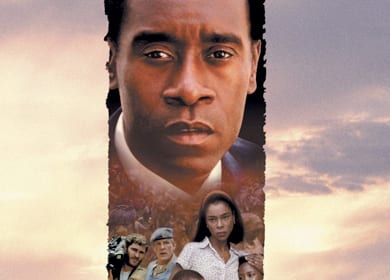 While the film Hotel Rwanda was released nearly 10 years ago in 2004, it has a transcendent ability to take us on a journey of examination of our attitudes toward issues of social justice, an examination that is as relevant today as it was the day this movie was released. The film is based on the true story of Paul Rusesabagina, a hotel manager who was able to house and protect more than 1,200 refugees during the 1994 Rwandan Genocide. For those unfamiliar with this event, it was the result of Rwandan civil unrest on a grand scale and claimed nearly one million lives.
While the film Hotel Rwanda was released nearly 10 years ago in 2004, it has a transcendent ability to take us on a journey of examination of our attitudes toward issues of social justice, an examination that is as relevant today as it was the day this movie was released. The film is based on the true story of Paul Rusesabagina, a hotel manager who was able to house and protect more than 1,200 refugees during the 1994 Rwandan Genocide. For those unfamiliar with this event, it was the result of Rwandan civil unrest on a grand scale and claimed nearly one million lives.
The story begins at a time of mounting unrest between the rival Hutu and Tutsi clans. Many involved believe that war is inevitable, while others hope for a peaceful conclusion to the civil conflict. Paul, who is a Hutu, manages a hotel in Kigali Rwanda and is married to Tatiana, who is a Tutsi. When violence finally breaks out, Paul’s natural first priority is the safety of his family, but he soon discovers that his conscience will not permit him to turn a blind eye to the impending death of so many. He begins to take and hide refugees in the hotel he manages, shielding them from the Hutu militia that is indiscriminately killing any and all Tutsis that they can hunt down. As the hotel fills to capacity, all anyone can do is wait and hope that the conflict will either be over soon, or that U.N. or other forces will step in to stop the violence.
In one gripping scene, an American cameraman ventures out into the violence and destruction in an attempt to film what is happening outside the walls of the hotel. He returns with footage showing people being brutally murdered in the streets with machetes, Paul, who until now had not grasped just how bad things really were, is there to see the tape. The cameraman later apologizes to Paul for showing the tape while he was in the room, but Paul says that he is glad the footage will be shown around the world, and that because of it, help will be sent. At this, the cameraman tells Paul that help still may never come. Paul asks how the world could not intervene after witnessing such terrible atrocities, to which the cameraman replies, “If people see this footage, I think they’ll say ‘oh my God, that’s terrible,’ and then they’ll go on eating their dinners.”
This scene has the power to turn the viewer’s stomach more than any scene of violence because of how close to home it hits most of us. It forces us to ask ourselves, “How many times have I done this? How often do I see terrible injustices happening around me, and just keep on ‘eating my dinner?’” Whether it be on a global front, or in your own community, when is the last time you were moved to action? This also begs another question. Why do we choose not to act? Is it truly, as we often claim, that we don’t believe we can really make a difference? Or, if we’re being honest, is it actually that we’re very busy and, while the pain of someone we have never met is awful, we have more pressing things on our calendars today?
Hotel Rwanda is everything a truly great film should be. It moves at times from inspiring to haunting, and from horrible to beautiful. The screenplay is brilliantly written, and the performances from the cast are incredible as well. Of those, Don Cheadle, who plays Paul, easily shines the brightest, With a PG-13 rating, this is film is not as graphic in its depiction of violence as one might expect, but it is no less gripping or shocking for it.
Undoubtedly, this film will move you emotionally. More than that, if you allow it, this film might just move you to see what you can do to make a difference in the world God has placed you in. Christ has called us to minister to widows and orphans, to feed the hungry and clothe the naked, and to stand by those who can’t stand by themselves. The question is, are we?

Comments